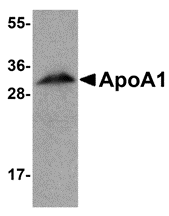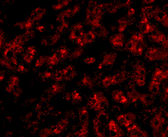Catalog# : 5097
Apolipoprotein A1 (ApoA1) is the major protein component of high density lipoprotein (HDL) in plasma. ApoA1 is synthesized in the liver and small intestine and promotes cholesterol efflux from tissues to the liver for excretion. It is a cofactor for lecithin cholesterolacyltransferase (LCAT), the enzyme responsible for the formation of most plasma cholesteryl esters. Defects in ApoA1 are associated with HDL deficiency, Tangier disease, and systemic non-neuropathic amyloidosis.
Additional Names : ApoA1, Apolipoprotein A1, ApoAI
 Description
DescriptionLeft: Western blot analysis of ApoA1 in human liver tissue lysate with ApoA1 antibody at 1 µg/ml.
Below: Immunofluorescence of ApoA1 in human liver tissue with ApoA1 antibody at 20 µg/ml.
Other Product Images

Source : ApoA1 antibody was raised against a 17 amino acid peptide from near the amino terminus of human ApoA1.
Purification : Affinity chromatography purified via peptide column
Clonality and Clone : This is a polyclonal antibody.
Host : ApoA1 antibody was raised in chicken. Please use anti-chicken secondary antibodies.
Application : ApoA1 antibody can be used for detection of ApoA1 by Western blot at 1 - 2 µg/ml.
Tested Application(s) : E, WB, IF
Buffer : Antibody is supplied in PBS containing 0.02% sodium azide.
Blocking Peptide : Cat.No. 5097P - ApoA1 Peptide
Long-Term Storage : ApoA1 antibody can be stored at 4ºC, stable for one year. As with all antibodies care should be taken to avoid repeated freeze thaw cycles. Antibodies should not be exposed to prolonged high temperatures.
Positive Control
1. Cat. No. 1304 - Human Liver Tissue Lysate
Species Reactivity :H, M, R
GI Number : 113992
Accession Number : P02647
Short Description : Apolipoprotein A1
References
1. Sorci-Thomas MG, Prack MM, Dashti N, et al. Differential effects of dietary fat on the tissue-specific expression of the apolipoprotein A-I gene: relationship to plasma concentration of high density lipoproteins. J. Lipid Res. 1989; 30:1397-403.
2. Lai C-Q, Parnell LD, and Ordovas JM. The APOA1/C3/A4/A5 gene cluster, lipid metabolism and cardiovascular disease risk. Curr. Opin. Lipid. 2005; 16:153-66.

No comments:
Post a Comment